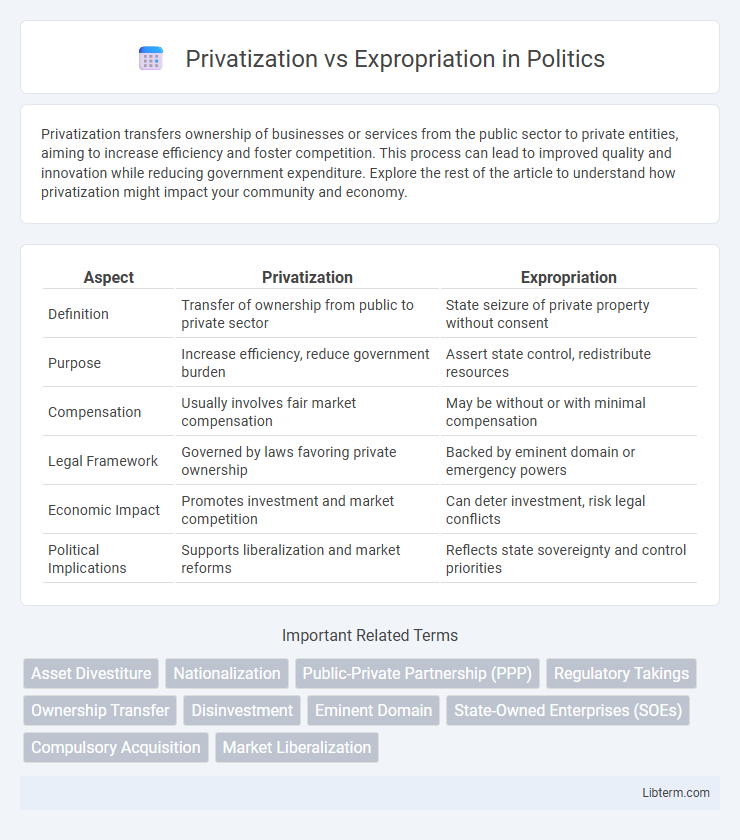Privatization transfers ownership of businesses or services from the public sector to private entities, aiming to increase efficiency and foster competition. This process can lead to improved quality and innovation while reducing government expenditure. Explore the rest of the article to understand how privatization might impact your community and economy.
Table of Comparison
| Aspect | Privatization | Expropriation |
|---|---|---|
| Definition | Transfer of ownership from public to private sector | State seizure of private property without consent |
| Purpose | Increase efficiency, reduce government burden | Assert state control, redistribute resources |
| Compensation | Usually involves fair market compensation | May be without or with minimal compensation |
| Legal Framework | Governed by laws favoring private ownership | Backed by eminent domain or emergency powers |
| Economic Impact | Promotes investment and market competition | Can deter investment, risk legal conflicts |
| Political Implications | Supports liberalization and market reforms | Reflects state sovereignty and control priorities |
Understanding Privatization: Definition and Key Concepts
Privatization refers to the transfer of ownership, management, and control of enterprises or assets from the public sector to private entities, aimed at increasing efficiency and fostering competition. It involves key processes such as divestiture, contracting out, and public-private partnerships, each designed to reduce government involvement in business activities. The core concepts emphasize market-oriented reforms, enhancing productivity, and improving service quality through private sector participation.
Expropriation Explained: Meaning and Implications
Expropriation refers to the government's act of taking private property for public use, typically with compensation to the owner, but often contentious due to disputes over fairness and valuation. This process can significantly impact investor confidence and foreign direct investment, especially in countries with unstable legal frameworks. Understanding expropriation laws and treaties, such as bilateral investment treaties (BITs), is crucial for businesses operating internationally to mitigate risks and protect assets.
Historical Context: Privatization and Expropriation Across Time
Privatization and expropriation have shaped economic landscapes differently throughout history, with privatization expanding notably during the late 20th century as governments shifted from state control to market-driven economies, especially in countries like the United Kingdom under Margaret Thatcher and the United States during the Reagan administration. Expropriation, historically employed as a tool for state control or revolutionary change, was prominent in Latin America during the 20th century, where governments like Mexico's nationalization of oil in 1938 reasserted sovereignty over foreign assets. The contrast between these processes reflects broader ideological shifts, with privatization promoting market liberalization and expropriation emphasizing nationalization and state intervention.
Economic Impacts of Privatization
Privatization often leads to increased efficiency and productivity by transferring ownership from public to private sectors, encouraging competition and innovation. Economic impacts include improved resource allocation, enhanced service quality, and attraction of foreign direct investment, contributing to GDP growth. However, these benefits depend on regulatory frameworks and market conditions to prevent monopolies and ensure equitable access to services.
Economic Impacts of Expropriation
Expropriation often leads to significant economic disruptions, including reduced foreign direct investment (FDI) due to heightened investor risk perceptions and increased capital flight. The sudden transfer of assets from private to public ownership can impair productivity and efficiency, disrupting supply chains and eroding market confidence. Governments may face budget constraints as compensations and legal disputes increase, further straining public finances and economic growth.
Legal Frameworks Governing Both Processes
Legal frameworks governing privatization typically involve regulatory policies that facilitate the transfer of state-owned assets to private entities through transparent bidding and contractual agreements. Expropriation laws, by contrast, establish government authority to seize private property for public use, requiring just compensation and adherence to constitutional protections. Both processes are subject to judicial review to ensure compliance with national legal standards and international treaties on property rights.
Advantages and Disadvantages of Privatization
Privatization offers increased efficiency and improved service quality by transferring state-owned enterprises to private ownership, fostering competition and innovation. However, it can lead to job losses, reduced public accountability, and potential monopolies if regulatory frameworks are weak. The balance between economic growth and social equity remains a critical challenge in privatization policies.
Risks and Consequences of Expropriation
Expropriation involves the government seizure of private assets, posing significant risks such as loss of investor confidence, capital flight, and disruption of economic stability. Consequences often include prolonged legal disputes, reduced foreign direct investment, and deteriorating relationships between the state and private sector. Unlike privatization, which transfers public assets to private control to enhance efficiency, expropriation undermines property rights and can stifle economic growth.
Case Studies: Successful and Failed Examples
Case studies on privatization reveal successes like the UK's British Telecom, where transferring state assets to private ownership enhanced efficiency and innovation, boosting economic growth. Conversely, expropriation cases such as Venezuela's oil industry nationalization resulted in decreased production and foreign investment flight, highlighting risks of state seizure without compensation. Failed privatizations in Russia during the 1990s led to corruption and asset stripping, demonstrating the necessity of regulatory frameworks to ensure positive outcomes.
Privatization vs Expropriation: Which Path is Sustainable?
Privatization transfers ownership of state-run enterprises to private entities, aiming for efficiency, innovation, and market-driven growth, while expropriation involves the state reclaiming private assets often without fair compensation, which can deter investment and economic stability. Sustainable economic development favors privatization due to its promotion of competitive markets, improved resource allocation, and enhanced productivity, contrasting with expropriation's potential to create uncertainty and undermine property rights. Empirical studies show that countries embracing privatization experience higher GDP growth and foreign direct investment inflows compared to those frequently engaging in expropriation.
Privatization Infographic

 libterm.com
libterm.com